
New technologies to improve health and safety performance
Discovering Safety joins forces with Safetytech Accelerator to build a Smarter Regulation Sandbox.
This page is approximately a 4 minute read
This page was published on

Dame Una O'Brien, Trustee
Una is a Trustee of the Foundation and is also a member of the Lloyd's Register Group and Foundation Remuneration Committees.
Lloyd’s Register Foundation is pleased to announce the appointment of a new trustee, former Whitehall Permanent Secretary, Dame Una O’Brien.
Una has wide-ranging experience of healthcare policy and government having held a variety of senior policy roles across government and the NHS over a 30-year career in public service. Whilst working primarily in and for the Department of Health, she was also the Principal Private Secretary to the Secretary of State for Transport and worked in the Prime Minister’s Efficiency Unit under both Conservative and Labour governments. Between 2010 and 2016 she was the Permanent Secretary at the Department of Health, the first woman to hold the post in the department’s history.
Last week, we sat down with Una to discuss the challenges of the last year and what safety means to her.
I’m delighted to be joining the Foundation as a Trustee and to contributing in a number of ways to Lloyd's Register Foundation’s reach and impact. Building on Brian Bender’s legacy, I would hope to bring a perspective on government, political life and public service to the Board table. Second, I’ll be able to share my experience as a non-executive and trustee in the charitable and higher education sectors as currently I serve on three other boards: Macmillan Cancer, one of the UK’s largest charities, the London School of Hygiene and Tropical Medicine, a leading health research institution and the Ashmolean Museum, part of the University of Oxford. Third, as a former chief executive, and now a leadership coach, I’ll be happy to support the Director and the Foundation's team in whatever way I can that’s consistent with my role as a trustee.
Although Lloyds Register Foundation was new to me, as soon as I heard about the opportunity last summer to become a trustee I was drawn in by a strong sense of alignment with the purpose and values of the Foundation. During my career I’ve been closely involved with a number of major failings in public policy which could have been prevented if systems had been better designed or people behaved differently. That’s why the Foundation’s purpose of reducing risk and enhancing safety of critical infrastructure, essentially minimising man-made disasters and saving lives, is so compelling.
Ever since the late 1990’s, when I helped to run a high-profile public inquiry into children’s heart surgery, I’ve had an enduring interest in issues of risk and safety in complex environments and delivery systems.
Back then, we had to unravel a public scandal in a Bristol hospital where more young infants sadly had died following complex heart surgery than in any comparative setting in the UK. It turned out this was a multi-layered story of personal shortcomings reinforced by weak risk and accountability systems and a culture of deference inhibiting junior staff from raising concerns. No one person had gone to work deliberately to do a bad job, on the contrary, but the outcome of those working practices and system weaknesses combined over many years to produce a major service failure. The impact on everyone involved was devastating.
The Inquiry’s report led to significant improvements in safe systems and safety culture across the NHS; we drew extensively on the approach used in high-risk industries across the world, particularly the nuclear and airline industries, as well as research into human factors and the culture of safe systems.
More recently, over the last three years, I was on the panel of a public inquiry in Northern Ireland, investigating the failed Renewable Heat Incentive scheme which nearly bankrupted the government there. So many lessons have come from that, not least how difficult and expensive it is going to be to get homes and businesses to shift to renewables.
We can’t even begin to work that out yet, but my hope would be that we will care about, and pay for, more resilience in all parts of society in future. The work being done at the Foundation to build resilience into major global safety challenges has been made even more poignant and meaningful considering the scale of the impact of the pandemic.
People always think about how events affect us practically, but what is so profound about this crisis is how it affects interpersonal relationships and human behaviours. Who would have thought that we would accede to government requests not to see families and loved ones? The collective psychological impact of that is difficult to comprehend. The truth is that we are living through something of epic historic proportions the effects of which people will study for decades, even centuries, to come.
If the evidence emerging from recent events such as the Grenfell Tower fire Inquiry and our current life under the Covid-19 pandemic are anything to go by, it should be the great need to act globally and collaboratively to anticipate and manage the wide range of natural and man-made risks to a sustainable future. Never have the activities of the Foundation seemed more important and I’m looking forward to playing a part in its work.